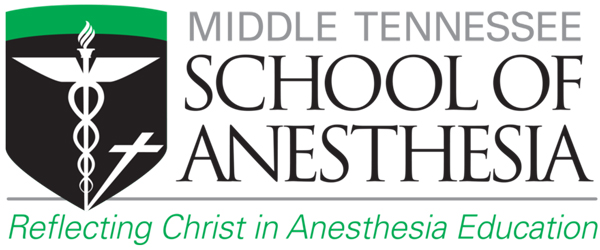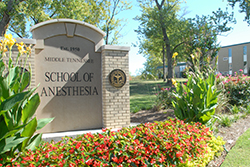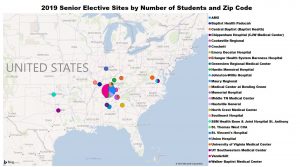Practice Doctorate/DNAP Program -- for RNs only
The Doctor of Nurse Anesthesia Practice (DNAP) degree is the highest practice degree in nurse anesthesia. MTSA offers the DNAP Practice Doctorate to registered nurses who have met each of the application requirements for admission. The DNAP Practice Doctorate is a full-time course of study for 36 consecutive months, on the campus of MTSA. In the third semester of the DNAP program, students will begin a rigorous clinical rotation process that offers students a vast array of clinical experiences in the peri-anesthesia setting. These clinical rotations will allow students to learn and sharpen their anesthetic skills throughout the remainder of the program.
The Practice Doctorate curriculum is designed to apply the scholarly process for translating evidenced based research into clinical practice. The scholarly project is a culmination of all course work during the program exemplified in a professional electronic portfolio. As well, students produce a nurse anesthesia quality improvement project in the areas of practice, education, administration or business management.
Practice Doctorate application cycle: Dec. 1 – May 31
Our current admission cycle is closed. Be on the lookout for information about our next admission dates and open house opportunities. If you’re interested in scheduling a tour, please email admissions@mtsa.edu.
Note: CCRN required to apply; minimum of 1.5 years of experience preferred post orientation and prior to the application deadline of May 31.
Learn more about the application process:
Overview»
Requirements»
Admission Checklist»
Interview Process»
Comparison to PhD»
Admissions Contact»
Evaluating and Awarding Academic Credit Policy»
Are you a prospective student and interested in learning more about MTSA? Sign up here to receive emails about Open House, Advanced Physiologic Foundations Class application openings, and more!
To request a copy of a previous edition of the MTSA Student Catalog and Handbook, please contact the Registrar’s Office at registrar@mtsa.edu.
Frequently Asked Questions
(Practice Doctorate/DNAP Program*)
How many years of experience are required to apply?
A minimum of 1 year of experience (beyond orientation and before the application deadline of May 31) as a registered nurse in a critical care area such as SICU, Neuro ICU, CVICU, CCU, MICU or Trauma ICU. CCRN is required for every applicant.
What is the length of the program?
Our program is 36-months long with 15 week semesters.
When does the program start?
The start of the program is January each year. We only accept one cohort per year.
When can I apply?
The application cycle is open December 1 through May 31 each year. We encourage you to apply earlier rather than later as it can take time to retrieve and submit all required documents of the program.
What is the average GPA of applicants that are accepted?
This data varies slightly each year, but historically the average cumulative GPA is 3.4. Average cumulative science GPA is 3.5.
What is an “early interview?”
An early interview may be considered for applicants meeting the following minimum criteria: Minimum 3.5 science GPA, minimum 150 GRE score (quantitative), minimum 150 GRE score (verbal), minimum two (2) years of ICU experience, current CCRN certification. Applicants interested in the possibility of an early interview must apply via NursingCAS by March 15 to be considered.
What kind of references are needed for the CRNA program?
We require three references in total, though you are allowed to request up to five in NursingCAS. Current ICU shift leader, team leader, nurse manager, or other supervisor(s) – (2 references); Academic — professor, teacher, nurse educator (1 reference).
How much is tuition?
The 2026 cohort’s tuition for the PD program is $116,865 plus a $1,500 clinical fee in Semester 6. The tuition is divided over the 9-semester program. It is not uncommon for each cohort to have an increase in tuition.
Is a BSN required?
A minimum of a baccalaureate degree in nursing OR a licensed Registered Nurse with a baccalaureate degree in a related field of science is required to apply. If your baccalaureate degree is not in nursing, you must have at least 15 semester hours of biophysical sciences beyond the basic nursing degree in addition to a bachelor’s degree in a related field of science.
What is the Chemistry Course prerequisite?
A minimum of a 3-credit hour college level chemistry course covering the principles of basic chemistry, biochemistry, and organic chemistry is required if your nursing degree did not require a chemistry course. A lab is not required to fulfill the requirement.
Do you require the GRE and if so, what is the minimum score required?
Yes, the GRE is required. A minimum score of 150 (verbal and quantitative) or a combined 300 is recommended for admission consideration. The GRE is waived for applicants who have earned a master’s or doctoral degree from a regionally accredited college or university in the United States.
I took your Advanced Physiologic Foundations Course. Does this guarantee admission into your program?
No, taking our Advanced Physiologic Foundations Course does not guarantee admission into the program, nor does it guarantee an interview, but it does help strengthen your application when our Admissions Committee meets to review applications.
Will any class credits from other institutions transfer and be accepted by MTSA for the Practice Doctorate?
Due to the single purpose, lock step nature, anesthesia-focused educational curricula that MTSA offers, transfer credit will not be accepted to the DNAP PD program.
In the rare instance that a student applies to transfer into the DNAP Completion program from another DNAP completion program, MTSA would allow that applicant to petition the NAP Council for consideration of transfer of up to six (6) hours of academic credit for courses that are determined to be identical in overall student learning outcomes.
What is your class size?
Our program is designed for all students beginning in the same year to take all courses together (lock-step). Currently, we can accept up to 75 students per year.
Do the students choose their clinical sites?
No. The Clinical Schedule Coordinator, in conjunction with the Program Administrator, creates the schedule for all students. We currently have 28 sites located throughout Middle Tennessee and a few out-of-state sites. However, the Senior elective, which is the last semester of the program, is selected by the student (with approval of the Program Administrator). For reference, the Student Catalog contains a list of hospitals that have participated in the Senior Elective program in the past. (Example: Class of 2019 Senior Elective Locations>>)
Are online classes available for the PD program?
No. All courses will be offered on the MTSA campus.
Does MTSA accept students of religious faiths other than Seventh-day Adventists?
Yes. In fact, only approximately 8 – 10 percent of the students in any given class are members of the Seventh-day Adventist Church. Our students come from a variety of religious backgrounds. In addition, we are committed to a policy of non-discrimination and welcome students of all faiths. MTSA is a Christian institution and that philosophy is prevalent in all phases of school life.
Do you have resources for CRNAs to help determine a career path and salary expectations after graduating from MTSA?
Yes, the following resources can help prospective students learn more about a career path and salary expectations: Nurse Anesthetist careers, BLS Occupational Outlook.










